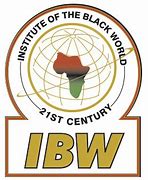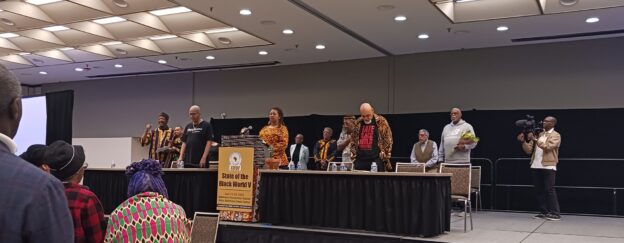The Institute of the Black World (IBW) hosted the Fifth State of the Black World Conference (SOBWCV) at the Baltimore Convention Center from April 19-23, 2023.
The theme for the Conference was “Global Africans Rising: Empowerment, Reparations and Healing”. As the IBW Web site (https://ibw21.org/sobwcv/) states, “Convened by the Institute of the Black World 21st Century, the State of the Black World Conference is an international gathering of people of African descent to assess the condition of Black people in the U.S. and globally with working sessions around key issues.”
The following details are from the Web site of the State of the Black World Conference V, https://ibw21.org/sobwcv/.
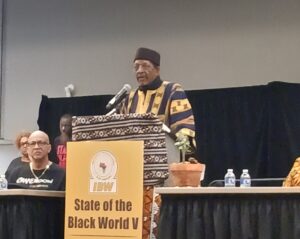
Dr. Ron Daniels.
SOBWC-V 2023 Goals, from the Web site, were as follows:
- Reassessing the Impact and Implications of the historic 2022 Mid-Term Election on the State of Black America and the Pan African world.
- Expanding the Multifaceted U.S. and Global Reparations Movements to empower and heal Black families, communities and nations.
- Advancing strategies and models to effectively address issues of vital concern to Black America and the Pan African world, e.g., the War on Drugs, mass incarceration, gun violence and fratricide, gentrification, environmental justice, climate change, safe, clean and accessible water.
- Advancing strategies and models for socially responsible, human-centered, democratic and sustainable entrepreneurial business/economic development in Black communities in the U.S. and the Pan African World.
- Mobilizing/organizing the Global Black Diaspora to engage Africa to foster the development of interdependent, self-reliant, business/economic, social and cultural enterprises, institutions and initiatives.
- Promoting a consciousness and commitment to Black self-support, self-reliance and self-determination to consolidate, expand and empower Black organizations, agencies and institutions for the survival and development of Black families, communities and nations.
- Promoting cross-generational dialogue and engagement to advance strategies and models to empower and heal Black families, communities and nations
Programmatic Features were highlighted on the first day of the Conference. - Pan African Institute: The State of Democracy and Development in Africa, the Caribbean Central and South America
- National/International Town Hall Meetings: The State of Black America and the Pan African World, The State of the Global Reparations Movement
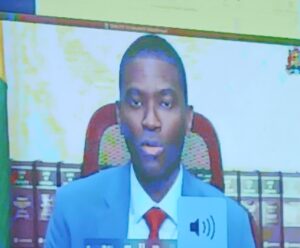
The Honorable Dickon Mitchell, Prime Minister of Grenada, made a video tribute to the late Grenadian leader Maurice Bishop.
Two-hour Issue Area Plenary and Working Sessions were held on Thursday, April 20 and Friday, April 21, which focused on the following issues, each of which was explored in concurrently-running sessions all day Saturday, April 22:
- Environmental Justice, Climate Change and Water as A Human Right (which highlighted the poisoned water in Flint, Michigan and Jackson, Mississippi, the struggle of the Afrikan-American population of Sandbranch, Texas and issues of rural environmental racism)
- Displacing Black People and Black Culture: Gentrification as a State of Emergency in Black America (which cited examples from Texas, California and other urban and rural areas as examples of gentrification and Black land loss)
- Socially Responsible Black Business/Economic Development
- Combating Gun Violence and Murders/Fratricide in Black Communities: A Public Health Crisis
- Reimagining Public Safety and Law Enforcement (this session also dealt with police brutality and misconduct)
- Making Black Lives Matter
- Building the U.S. and Global Reparations Movements
Participants were asked to sign up for one of the above Issue Sessions so they could participate in the “deep dive” on Saturday. The Thursday and Friday sessions served as an “introduction” to the specific issue and to allow all attendees to get a feel for all of the issues.
Another important focus group that met on Saturday was a special panel dealing with the struggle of the people of Haiti (or “Ayiti” as some activists and scholars cite as the proper name).
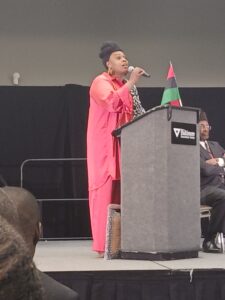
Sis. Kim Poole of the Teaching Artist Institute (TAI) addresses the audience.
A side-event to the Conference was the Hip Hop Caucus, moderated by Sis. Kim Poole and Bro. Haki Ammi of the Teaching Artist Institute (TAI), which explored The Role of Hip Hop in the Black Freedom Struggle as part of the observance of the 50th anniversary of Hip Hop. A special panel during the Hip Hop Caucus featured international Pan-Afrikanist Dr. Barryl Biekman from the African Union African Diaspora Sixth Region Facilitators Working Group and Tiye International in The Netherlands, as well as former Ugandan Member of Parliament and former presidential candidate Bro. Robert Kyagulanyi Ssentamu, more famously known as Afrikan musician Bobi Wine.
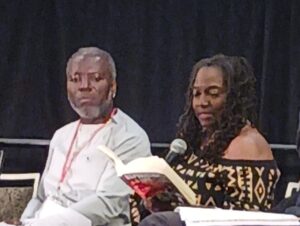
Reparations activist Kamm Howard and attorney Nkechi Taifa.
Special guest speakers included, but were not limited to, the following:
- Honorable Dickon Mitchell, Prime Minister of the Republic of Grenada (by video from Grenada)
- Honorable P.J. Patterson, former Prime Minister of Jamaica
- Dr. Julius Garvey, son of The Honorable Marcus Mosiah Garvey, serving as the Honorary Master of Ceremonies and Chairman of the Conference
- Marc Morial, former mayor of New Orleans and current President of the National Urban League
- Professor Hilary Beckles, considered the world’s foremost scholar and champion for Reparations
- David Comissiong, Ambassador to the Caribbean Economic Community (CARICOM)
- Dr. Leonard Jeffries, venerable Pan-Afrikanist, historian, activist and scholar
- Dr. Julianne Malveaux, longtime author, teacher and media political commentator
- Mel Foote, Chairman of the Constituency For Africa (CFA)
- Robert Kyagulanyi Ssentamu, also known as Bobi Wine, musician, former Member of Parliament and former presidential candidate in Uganda
- Rev. Lennox Yearwood, co-coordinator of the Hip Hop Caucus
- Ronald Hampton, veteran law enforcement officer and longtime critic of police misconduct
- Kareem Aziz, local educator and IBW Board Member
- Dr. George Fraser, veteran business person, author of Success Runs In Our Race, Mission Unstoppable and other important books
- Dr. Claire Nelson, founder and president of the Institute of Caribbean Studies
- Makani Themba, Chief Strategist at Higher Ground Change Strategies based in Jackson, Mississippi
- LaTosha Brown co-founder of Black Voters Matter
- Tarana Burke, civil rights activist who started the Me Too Movement
- Mirelle Fanon Mendes France, daughter of iconic Pan-Afrikanist Dr. Frantz Fanon
- Don Rojas, Vice President of IBW and Media Director
- Milton Allimadi, author and columnist
- Kim Poole, founder of Teaching Artist Institute (TAI)
- Haki Ammi, president of Teaching Artist Institute (TAI)
- Maryland State Senator Jill P. Carter
- Kobi Little, President, Baltimore NAACP
- Bill Fletcher
- Attorney Nkechi Taifa
- Kamm Howard, longtime Reparations activist
- Emira Woods
- Dr. James Early
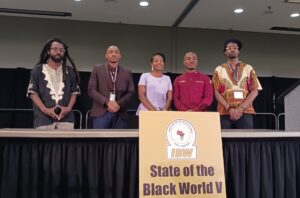
The Young Leaders Panel.
Special Sessions included the following:
- Global Black Leadership Summit Breakfast
- Global Black Women’s Leadership Summit Breakfast
- Global Black Mayors and Elected Officials Roundtable Breakfast
- Crisis in Haiti: The First Black Republic
- The Black World Media Network
- Opening and Closing Ndaba Plenary Sessions, including Cultural/Spiritual Rituals, Welcome, Greetings and Solidarity Statements and Keynote Presentations
- Legacy Award and Cultural Extravaganza, including Presidential Legacy and Pan African Service Awards to Outstanding Leaders from the Global Black
- Community and Cultural Presentations
- African Market Place where a variety of vendors presented cultural and informational items for sale, featuring an exquisite variety of Black arts, crafts, apparel and other products, Exhibits by African and Caribbean Travel and Tourism Bureaus, Informational Booths by Civil Rights, Social and Civic Organizations, and Informational Booths by Conference Sponsors
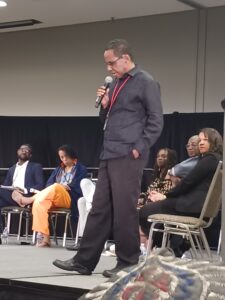
CARICOM Ambassador David Commissiong.
There are several articles on the Web site of the Institute of the Black World (IBW) about the Conference, including:
SOBWCV concludes with calls for stronger global Black connections by Dr. Julius Garvey and Dr. Ron Daniels
https://ibw21.org/news/press-release/sobwcv-concludes-with-calls-for-stronger-global-black-connections/
Vantage Point: Report Back From State of the Black World Conference V
https://ibw21.org/video-audio/vp-radio-posts/042423-vantage-point-dr-ron-daniels-sobwcv/
Dynamic New Generation Speak on Final Day of the State of the Black World Conference V in Baltimore, By Don Rojas
https://ibw21.org/news/initiative-posts/sobwc-posts/dynamic-new-generation-speak-on-final-day-of-sobwcv/
Post SOBWCV message from Dr. Ron Daniels
https://ibw21.org/news/post-sobwcv-message-from-dr-ron-daniels/
More reports from the Conference are expected to be added to the IBW Web site in the coming days and weeks.
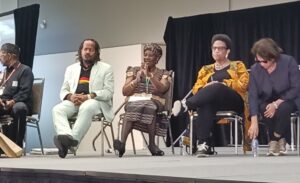
Dr. Barryl Biekman, speaking on the Reparations Panel.
Our Personal Impressions of the State of the Black World Conference V
We would like to congratulate the Institute of the Black World for holding the Fifth State of the Black World Conference (SOBWCV). I thoroughly enjoyed my time at the Conference, from learning at the plenaries and breakout sessions to interacting with the vendors, presenters and other attendees. A conference of this scope is exceedingly difficult to pull off successfully, and in my opinion this was, on the whole, a successful one.
Most conferences I have attended, including some conferences of organizations I belong to, constantly must deal with running the risk of devolving into “talk shops” where invited speakers and dignitaries spend more time rehashing the issues we face ad nauseam or bragging repeatedly about their plans and their seminal role in meeting these issues and helping “save the Black Race” than figuring out specifically what we will do about them and how we will make the “saving of the Black Race” a reality in the real world. Many conferences never get past the “whereas” part of the discussion (where the problem is re-stated) to reach the “now therefore” part where the solutions and responses are developed, presented to the public and implemented for all to see. This conference strove to be different, and I appreciate that. The “deep-dive” breakout sessions that were the main feature of the Saturday activities showed IBW’s commitment to “drill down” on these issues to work on finding those solutions, and to enlist the ideas of conference attendees to help bring these solutions out. The two-hour sessions on Thursday and Friday allowed all of the conference attendees to get a “snap-shot” of what all of the breakout sessions were going to concentrate on during the Saturday “deep-dive” sessions.
That being said, there were some areas where I personally felt the Conference did miss opportunities to go even further in the development and implementation of those solutions. I will list them here:
- There was not sufficient time in the Sunday open session, where the different “deep-dive” breakout groups were to make their reports to the general body, for those groups to present truly comprehensive (though summarized) reports that could have helped produce a Conference Declaration. I believe the breakout groups could have benefited from more time to present their points more fully. I am aware that the written summaries from these groups are going to be made available on the IBW Web site, but not everyone will go to the Web site to read those reports, and the conference attendees would have benefited from seeing and hearing all of the different breakout groups’ ideas for follow-up discussed in greater detail in open public session.
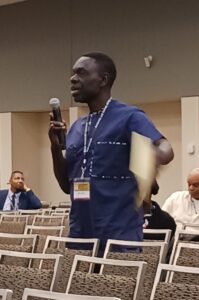
Pan-Afrikan Author and analyst Milton Allimadi.
- It was often noted in many of the breakout sessions that media exposure was important, and that we could not depend on the current “mainstream” corporate media to tell the world (or even just the Black World) about injustices such as Sandbranch, Texas, or the poisoning of the air in rural areas of North Carolina due to the apparently unregulated hog farming industry, or even honestly report on the poisoned water in Jackson, Mississippi and Flint, Michigan. It was clear to us that we needed to better mobilize our own Black Media to ensure that at least our community was made aware of the issues we face with regard to environmental racism and lack of access to drinkable water. Thus, a Saturday “deep-dive” breakout session on Building a Black Media Cooperative would have been most helpful, or even a mandate to end the conference that such a Cooperative be established. The brief media panel on Friday was important but there needed to be a focused “deep dive” similar to the other sessions on Saturday. IBW does have its own media outlet in the Black World Media Network, but the fact is that this multi-faceted issue is much larger than any one Black media organization, and a true Black Media Cooperative needs to be built that would include (but not be dominated by) Black World Media, Black Agenda Report, The National Black Unity News (who had a vendor’s table at the conference), Black-run Internet radio stations and every serious activist or organizer with a Web site (such as https://kuumbareport.com), a Facebook page, a Twitter feed, an Instagram account, a mic and a mouth, a YouTube channel or a Tik Tok, or who knows anyone connected to Black Media in any way, shape or form. Such a cooperative could establish standards of journalistic integrity, behavior, rigor and truth in research and reporting (to combat misinformation, baseless conspiracy-theories and rumor-mongering), and develop a means by which important stories can be documented, shared and propagated to all members of the cooperative and attract more members.
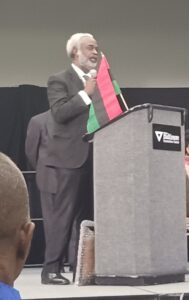
Baltimore City NAACP Director Kobi Little.
- Another comment that was made in many of these breakout sessions was the need for us to get together with other Pan-Afrikan/Black organizations, including those whose specific missions are different from ours. The Environmental group had several points of commonality with the Gentrification and Land Loss group, for example, since environmental racism is often a tactic used to force us to abandon our communities so corporations can enter them and perform their resource-extraction or land-expropriation missions relatively undisturbed. The Black Farmers in North Carolina (the hog farming capital of the world) and Georgia must grapple with environmental destruction (the poisoning of their ground, water and air by the industrial hog farmers) as well as the taking of their land by unscrupulous lawyers, mendacious politicians, corrupt Administration officials and racist financiers who impose usurious loans on them or deny them financing altogether. They all continue to suffer in part because they are not connected to effective legal counsel, political activists, grassroots organizers, business opportunities or media outlets who can make their struggle more visible to the public. Certainly, other breakout groups at some point made mention of the need to come together with the other groups to formulate a comprehensive, cooperative plan for Black People (though they probably didn’t say it quite that way). Thus, there needed to be a “deep dive” breakout session on Building Coalitions. It’s clear that most of our various organizers and activists are either not incentivized to build coalitions with each other or that they simply lack the knowledge and skill to pull it off. In either case, an attitude adjustment is required across the board, and a conference such as this one was an opportunity to offer just such an attitude adjustment. History is replete with examples of efforts that have failed, some disastrously, such as Tulsa, Oklahoma’s Black Wall Street in 1921, the progressive “Fusion” government in Wilmington, North Carolina in 1898, the Black Panther Party in the late 1960s-1970s and more. These efforts did not fail because they “didn’t work” as some critics have insisted. They failed because they were working alone. An economic enclave like Black Wall Street had no chance against a military-style attack led by the police. A political organization like Wilmington’s “Fusion” government could not withstand the wanton, merciless violence of right-wing White vigilante terrorism that had the governor of North Carolina himself afraid to ride a train that ran through the area. And the Black Panthers were unable to weather a coordinated assault that featured infiltration by FBI COINTELPRO agents-provocateur, military-style police assaults, media demonization and simultaneous prosecution of Panther leadership from coast to coast. The fact is, when you are surrounded on all sides, you cannot afford to armor yourself and shoot back in only one direction. If we are to succeed as a people in our struggle, we will have to actually learn from the past (instead of just acting like we have), bring together a variety of Pan-Afrikan activists and organizers from diverse organizations (artists, spiritual leaders, grassroots activists, educators, media, lawyers, political activists, scientists, businesses, international organizers, prison activists, Elders, women, men, youth, revolutionary activists and more) and persistently push them to overcome their philosophical differences about how to unify us so they can learn to first be in the same room without fighting and then start working on ways to combine their efforts into an overarching, comprehensive, cooperative strategy to move all of us forward based on the time-honored principle of Unity Without Uniformity. This will require us to loosen up some of our own ideological rigidity, put away our egos, let go of our sense of organizational entitlement and ownership of The Struggle, resolve our personal beefs and start having frank, honest, sincere and respectful conversations with each other. (The need to find ways to confront what differences we do have was exemplified by an argument between the Pan-Afrikan activist Irritated Genie and the Black Lives Matter panel that was sparked by an ill-advised libation that featured no Black men but began to move to other issues. To me, the issues of fighting homophobia at the same time that we fight against the emasculation and effeminization of Black men and the encroachment of Western cultural norms into Afrika were brought into stark focus, and the inability to discuss these issues without our emotions getting the better of us is something we must deal with if we are to move forward together.) We need to be able to reconcile our differences, whatever they may be, and realize those ways in which we are engaged against the same intractable White Supremacist enemy. We must also overcome this I-Have-The-Answer, Black-People-Must-Unify-Under-My-Leadership attitude that too many of us hold (even if we don’t admit it) and that keeps us from coming together and truly unifying. This is the objective of the Maryland Pan Afrikan Cooperative Coalition (MPACC, https://kuumbareport.com/spokes-of-the-wheel/maryland-pan-african-cooperative-coalition-mpacc/), which seeks to achieve just that mission by intentionally bringing different Pan-Afrikan organizations together. We are working to build a Pan Afrikan Cooperative Coalition in Maryland, and perhaps inspire similar efforts elsewhere and even on a global scale, by proposing an organizational structure that I call “Spokes of the Wheel”, which, as it turns out, gets its inspiration from Ancestor Mary McLeod Bethune’s National Council of Negro Women, which organized itself in a “spoked-wheel” structure back in 1935. My hope is that such a Cooperative Coalition could not only serve the interests of the organizations I belong to (Pan African Federalist Movement, https://pafmuas.org or https://www.pafm-northamerica.org; and Sixth Region Diaspora Caucus, https://srdcinternational.org), but also help to build a means by which the different Pan-Afrikan and pro-Black organizations in Maryland can start to make better progress in their own missions by acting interdependently as opposed to just independently. If we are going to call for unity, then we must do what we can to bring that unity about. If we are going to urge our activists to come together, we must explore and create the atmosphere and the means by which they can do that, often in spite of themselves.
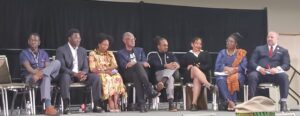
The Democracy in the Black World Panel.
Those are my suggestions for moving forward to make the State of the Black World Conferences, as well as any Pan-Afrikan conference that seeks to help Afrikan People make progress in our common global struggle, more impactful in the future. I wish to reiterate that I found the Fifth State of the Black World Conference to be a rewarding experience. The opportunity to meet with local comrades and allies, reconnect with friends from the Struggle I had not seen in some time, make new friends through our roles in this shared struggle and interact with such luminaries as Dr. Julius Garvey, Attorneys Mama Efia Nwangaza and Mama Nkechi Taifa, Dr. Leonard Jeffries, Kamm Howard and Mama Iyafin Amiebelle Olatunji (wife of the late, great Afrikan drummer Babatunde Olatunji), among other committed Pan-Afrikan activists and organizers, was a special treat. My comments and suggestions are in no way intended to detract from my expression of enjoyment of the Conference or my belief that this was an important and worthwhile effort. It is my hope that my personal comments will be taken in the spirit in which they are given, and that future conferences by IBW and other Pan-Afrikan/Black organizations will continue to make strides toward that point at which the Pan-Afrikan struggle for truth, justice and righteousness can take flight and bring victory within our grasp at last.
